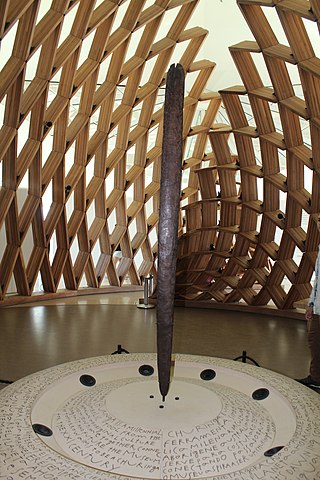Britain most often refers to:

In Aboriginal cultures of south-east Australia, Daramulum is a sky hero associated with Baiame, and an emu-wife. He is a shapeshifter.
In Arrernte mythology, Karora is a bandicoot ancestral deity. According to one legend, during the Dreamtime Karora lay sleeping in the earth when from his head rose a tall pole called a tnatantja. It was a living creature, its bottom resting on his head and its top reaching up into the sky. From his armpits and navel emerged bandicoots, who dug their way out of the earth just as the first sun rose into the sky. Karora followed them, seized two of the animals, then cooked and ate them. His hunger sated, he lay down to sleep again and a bullroarer emerged from under his armpit. It took on human form and grew into a young man, and when Karora woke his son danced around him. It was the very first ceremony.

The Last Continent is a fantasy novel by British writer Terry Pratchett, the twenty-second book in his Discworld series. First published in 1998, it mocks the aspects of time travel such as the grandfather paradox and the Ray Bradbury short story "A Sound of Thunder". It also parodies Australian people and aspects of Australian culture, such as Crocodile Dundee, The Adventures of Priscilla, Queen of the Desert and Mad Max films, the Australian beer XXXX, Vegemite, thongs, cork hats, the Peach Melba, Skippy the Bush Kangaroo, the bushranger Ned Kelly, the Henley-on-Todd Regatta, and the Australian songs "Waltzing Matilda", "Down Under", and "The Man From Snowy River".

The bullroarer, rhombus, or turndun, is an ancient ritual musical instrument and a device historically used for communicating over great distances. It consists of a piece of wood attached to a string, which when swung in a large circle produces a roaring vibration sound.
Prehistoric music is a term in the history of music for all music produced in preliterate cultures (prehistory), beginning somewhere in very late geological history. Prehistoric music is followed by ancient music in different parts of the world, but still exists in isolated areas. However, it is more common to refer to the "prehistoric" music which still survives as folk, indigenous or traditional music. Prehistoric music is studied alongside other periods within music archaeology.

A folk instrument is a traditional musical instrument that has remained largely restricted to traditional folk music, and is not usually used in the classical music or other elite and formal musical genres of the culture concerned, though related intruments may be.

The Dionysian Mysteries were a ritual of ancient Greece and Rome which sometimes used intoxicants and other trance-inducing techniques to remove inhibitions. It also provided some liberation for men and women marginalized by Greek society, among which were slaves, outlaws, and non-citizens. In their final phase the Mysteries shifted their emphasis from a chthonic, underworld orientation to a transcendental, mystical one, with Dionysus changing his nature accordingly. By its nature as a mystery religion reserved for the initiated, many aspects of the Dionysian cult remain unknown and were lost with the decline of Greco-Roman polytheism; modern knowledge is derived from descriptions, imagery and cross-cultural studies.

A Tjurunga, also spelt Churinga and Tjuringa, is an object considered to be of religious significance by Central Australian Aboriginal people of the Arrernte groups. The word derives from the Arrernte word Tywerenge which means sacred or precious. Tjurunga often had a wide and indeterminate native significance. They may be used variously in sacred ceremonies, as bullroarers, in sacred ground paintings, in ceremonial poles, in ceremonial headgear, in sacred chants and in sacred earth mounds.

The Murrinh-Patha, or Murinbata, are an Aboriginal Australian people of the Northern Territory.
A rhombus is a geometric shape often colloquially described as a diamond.

Breaking the Ethers is the debut album by the collaborative group Tuatara. Released on Epic Records, it was an attempt by members of Luna, the Screaming Trees and R.E.M. to try their hand at experimental, multi-ethnic music. It was produced by Barrett Martin and Justin Harwood.

The Bidawal were an Australian Aboriginal tribe of Gippsland, Victoria. According to Alfred William Howitt, the Bidawal were composed of "refugees from tribes".

Rituals is an album of contemporary classical music by American avant-garde composer John Zorn. The piece takes the form of an opera in five parts and was premiered at the Bayreuth Opera Festival in 1998.
Ted Genoways is an American journalist and author. He is a contributing writer at Mother Jones and The New Republic, and an editor-at-large at Pacific Standard. His books include This Blessed Earth and The Chain: Farm, Factory, and the Fate of Our Food.
Oro Festival is an event celebrated by various towns and settlements of Yoruba origin. It is an annual traditional festival that is of patriarchal nature, as it is only celebrated by male descendants who are paternal natives to the specific locations where the particular event is taking place. It venerates the Orisha Orò, the Yoruba deity of Bullroarers and communal justice. During the festival, females and non-natives stay indoors as oral history has it that Orò must not be seen by women and non-participating people. The ceremonies surrounding the celebration of Orò differ from town to town, and one is often called after the death of a monarch. When the Oba or other important official dies, a special atonement and period of mourning are held.

The Bardi people, also spelt Baada or Baardi and other variations, are an Aboriginal Australian people, living north of Broome and inhabiting parts of the Dampier Peninsula in the Kimberley region of Western Australia. They are ethnically close to the Jawi people, and several organisations refer to the Bardi Jawi grouping, such as the Bardi Jawi Niimidiman Aboriginal Corporation Registered Native Title Body and the Bardi Jawi Rangers.
The Norweilemil were an indigenous Australian people of the Northern Territory.










